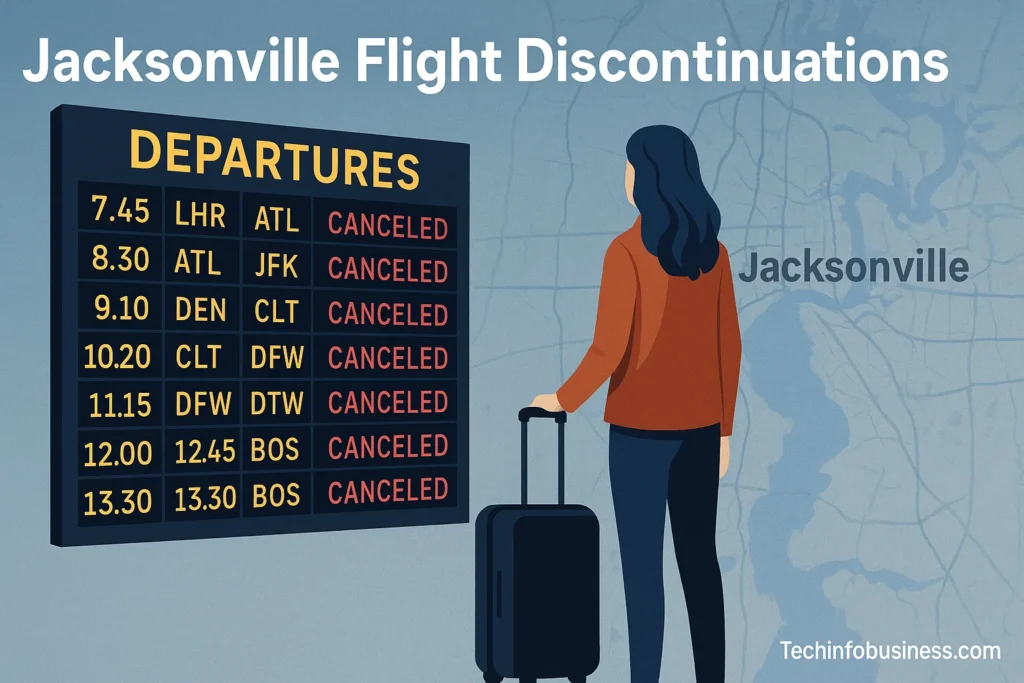In 2025, travelers flying in and out of Jacksonville, Florida, have been hit with an unexpected wave of flight cancellations and route suspensions that are changing how the city connects with the rest of the country—and beyond. Several major airlines, including JetBlue, Southwest, and Air Canada, have recently announced the discontinuation of key nonstop routes from Jacksonville International Airport (JAX), leaving passengers scrambling to adjust travel plans and raising questions about the airport’s future air service strategy.
While Jacksonville has been steadily growing in both population and economic influence, these flight cuts may seem counterintuitive. But behind the headlines are deeper industry trends involving route profitability, seasonal demand shifts, and evolving airline strategies. Whether you’re a frequent flyer, an occasional vacationer, or a business traveler relying on efficient air access, understanding the reasons for these Jacksonville flight discontinuations—and what they mean for you—is essential.
In this article, we’ll explore which routes are being cut, why airlines are scaling back service, how this impacts travelers and the local economy, and what’s being done to adapt and grow Jacksonville’s air travel future.
The Changing Landscape of Air Travel in Jacksonville
In 2025, Jacksonville International Airport (JAX) is experiencing a noticeable shift in its flight schedule, with several airlines discontinuing key routes. While Jacksonville has enjoyed a strong reputation as a reliable regional air hub in Northeast Florida, the latest wave of flight cutbacks is a clear signal that broader trends in the aviation industry are taking effect locally. These changes are raising concern among frequent flyers, leisure travelers, and the local business community alike.
Flight discontinuations are nothing new in the aviation world—airlines constantly assess route performance, fuel costs, seasonal demand, and profitability. But what makes the situation in Jacksonville noteworthy is the volume and timing of these changes. Several major carriers, including JetBlue, Southwest Airlines, and Air Canada, have either already cut flights or plan to do so by the end of 2025. For a growing city like Jacksonville, understanding what’s behind these decisions is critical for adjusting travel plans and anticipating the future of air travel in the region.
Which Flights Are Being Discontinued at Jacksonville Airport?
Multiple flight routes from Jacksonville International Airport are being trimmed, each for different strategic reasons. Let’s look at the most high-profile changes:
- JetBlue’s Nonstop Route to Fort Lauderdale was discontinued as of April 1, 2025. This route was particularly popular for travelers connecting to South Florida and beyond.
- Southwest Airlines discontinued its Jacksonville–Atlanta route on April 8, 2025. This was one of the few Southwest routes connecting travelers from Northeast Florida to a major Southeastern U.S. hub.
- Air Canada is suspending its Toronto–Jacksonville service during the 2025–2026 winter season, from November through March. The airline indicated that this is a seasonal suspension, with plans to resume in spring 2026.
Each of these routes had distinct value: JetBlue’s route connected travelers to one of Florida’s busiest airports, Southwest’s provided a vital hub connection, and Air Canada’s route was Jacksonville’s only nonstop link to Canada. Their removal leaves noticeable gaps in the airport’s connectivity map.
Why Are Airlines Cutting Routes from Jacksonville?
The reasons behind flight discontinuations are multifaceted and often rooted in airline economics, consumer behavior, and broader market dynamics. In Jacksonville’s case, several interwoven factors are at play:
1. Underperforming Routes
Airlines operate under the principle of profitability per seat. If a particular route is not filling enough seats consistently or yielding low revenue, the airline has little incentive to maintain it. JetBlue cited poor performance on its Florida routes as one of the core reasons behind its decision to cut the Fort Lauderdale service.
2. High Operating Costs
Rising fuel prices, labor costs, and regulatory expenses continue to weigh heavily on airline bottom lines. Airlines are looking to trim costs by consolidating their operations in more profitable markets and focusing on core routes that deliver consistent margins.
3. Strategic Realignment
Airlines like Southwest and Air Canada are constantly reviewing their network to optimize performance. For instance, Southwest pulled out of Jacksonville–Atlanta to allocate more aircraft to markets like Nashville and Dallas, which show higher growth potential and demand.
4. Seasonal Demand Patterns
The Toronto–Jacksonville route was heavily dependent on leisure travelers, particularly “snowbirds” traveling during the warmer months. Air Canada paused the service during the winter off-season when demand significantly drops. This type of seasonal adjustment is becoming more common across international routes.
How These Flight Cuts Impact Travelers
For Jacksonville-based travelers and inbound visitors, these discontinued routes present several practical challenges.
1. Fewer Nonstop Options
Nonstop flights are a major convenience for both business and leisure travelers. With fewer direct options, passengers are now forced to consider connecting flights, which often involve longer travel times, layovers, and greater chances of delay or missed connections.
2. Higher Ticket Prices
When airlines reduce the number of flights or eliminate competition on certain routes, prices tend to rise due to reduced seat availability. For example, travelers heading to South Florida from Jacksonville may now find themselves paying significantly more for flights that include a layover.
3. Inconvenience and Uncertainty
Frequent flyers who relied on certain nonstop routes for regular travel—such as business travelers flying to Toronto or families vacationing in Fort Lauderdale—are now forced to rework their itineraries. The changes also increase uncertainty for travelers who plan trips months in advance.
What This Means for Jacksonville’s Economy
Jacksonville is one of Florida’s fastest-growing cities, and its airport serves as a vital gateway for commerce, tourism, and logistics. Reductions in flight availability can have a ripple effect across various sectors of the local economy.
1. Business Connectivity
With fewer options for direct travel, companies based in Jacksonville may face logistical challenges in connecting with clients, partners, or offices in other parts of the country or internationally. This can influence where businesses choose to hold meetings, conferences, or even relocate operations.
2. Tourism and Leisure
Tourists looking for convenient access to Jacksonville’s beaches, historical sites, and golf courses may be deterred by the lack of direct flights, especially from regions like Canada. This impacts hotels, restaurants, and the local service industry.
3. Airport Growth and Reputation
Repeated route cancellations can impact Jacksonville International Airport’s reputation among travelers and airlines alike. Airlines might deprioritize the airport in future expansion plans if current routes underperform, although this isn’t a certainty.
What Is Jacksonville International Airport Doing in Response?
Despite the current cutbacks, Jacksonville International Airport isn’t standing still. The Jacksonville Aviation Authority (JAA) is actively pursuing new opportunities to expand air service and improve the airport’s appeal to both carriers and passengers.
1. Terminal Expansion
JAX is undergoing a major construction project with the addition of Concourse B, which will add six new gates. This project is a vote of confidence in the airport’s long-term growth and is intended to accommodate more flights and larger aircraft.
2. Route Development Team
JAA has a dedicated air service development team that works directly with airlines to pitch new routes and demonstrate local demand. These discussions include both domestic and international destinations.
3. Community Engagement and Support
Airport officials are encouraging travelers to fly from Jacksonville whenever possible. The more the community supports the airport, the more data airlines have to justify restoring or adding routes.
What Travelers Can Do to Adapt
While flight discontinuations are frustrating, travelers can take proactive steps to make their journeys smoother and even encourage airlines to restore dropped routes.
- Book Early: With reduced flight availability, booking tickets well in advance gives you the best chance at finding nonstop flights or better fares.
- Explore Alternative Airports: Orlando (MCO), Daytona Beach (DAB), and Savannah (SAV) can serve as viable alternatives depending on your destination.
- Use Flexible Travel Dates: Being flexible with travel dates allows you to take advantage of cheaper or more convenient flights.
- Stay Informed: Subscribe to airline newsletters and follow Jacksonville Airport’s announcements to stay updated on route changes and new service launches.
- Provide Feedback: Don’t underestimate the power of consumer feedback. Send suggestions to airline customer service portals or participate in airport surveys to show demand for discontinued routes.
Are New Routes on the Horizon?
Despite the setbacks, there’s reason for optimism. Jacksonville International Airport has a strong track record of attracting new service, and several airlines are expanding aggressively in the U.S. domestic market.
Carriers such as Breeze Airways, Avelo Airlines, and Allegiant Air are continuously looking for underserved routes that they can operate with low overhead. Jacksonville could be a prime candidate for these emerging airlines, especially as Concourse B construction nears completion.
Additionally, as travel rebounds and seasonal demand returns, Air Canada is expected to reinstate its Toronto service in spring 2026, offering hope that other international routes may follow.
Conclusion: Jacksonville’s Air Future Isn’t Grounded
Jacksonville flight discontinuations are certainly disruptive, but they’re not uncommon in the airline industry. What’s important is how the city, airport, and community respond to them. With strategic investments in infrastructure and active discussions with airlines, Jacksonville International Airport is positioning itself for a comeback.
For now, travelers need to stay informed, flexible, and vocal. While routes may come and go, Jacksonville’s position as a major Floridian hub isn’t in jeopardy—it’s simply evolving. And in aviation, evolution always leaves room for a strong return to the skies.



![KZ43X9NNJM65 Review: Features, Specs & Buyer’s Guide [2025 Update] 3 KZ43X9NNJM65](https://techinfobusiness.com/wp-content/uploads/2025/07/assets_task_01k0j5zb1eeykr9acrb7cx8mxp_1752957076_img_1-150x150.webp)